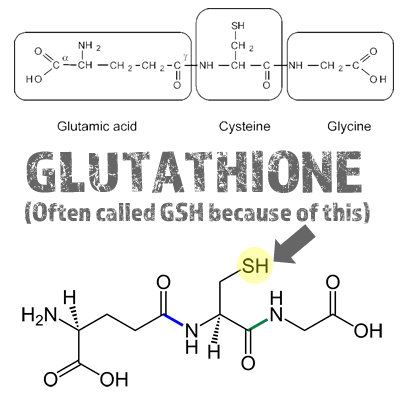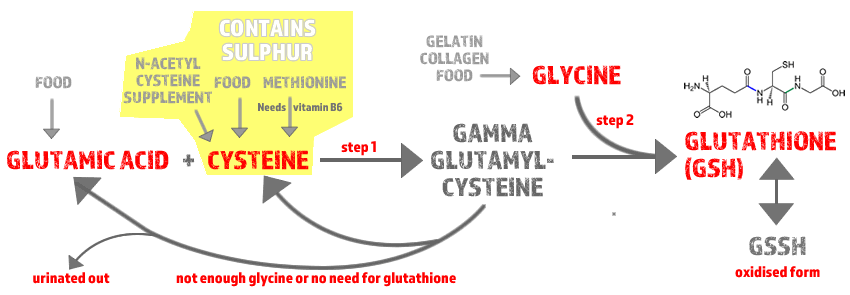Glutathione
Glutathione (GSH) is a short chain of 3 amino acids that plays several vital roles in the body. Every cell in our body produces glutathione and it's the most important antioxidant. Glutathione is central to recovery from exercise, it makes you feel good and prevents or overcomes both infectious diseases and chronic degenerative diseases. Glutathione protects your vision, boosts your immune system, helps turn carbohydrates into energy and prevents the buildup of oxidised fats that may contribute to atherosclerosis.
Glutathione is capable of preventing damage to important cellular components caused by reactive oxygen species such as free radicals, peroxides, lipid peroxides, and heavy metals. Glutathione is synthesised in the body from the amino acids L-cysteine, L-glutamic acid and glycine and we can get it from foods. Glutathione can dramatically raise energy levels, strengthen the immune system, fight inflammation, improve athletic performance, detoxify the body, aid in cellular repair and slow down the aging process.

A healthy adult has about 10g of glutathione circulating in the body tissues. Synthesis of glutathione depends upon the cells ATP, which is the molecule that provides cellular energy. Glutathione levels are linked to low energy and lethargy. This is a why exercise is so beneficial for your overall health as it boosts your glutathione levels. There is no RDA for glutathione.
- Glutathione maintains vitamins C and vitamin E in their active forms.
- Glutathione tightly regulates the production of hydrogen peroxide. Glutathione has a key function in the defence against reactive oxygen species (ROS) which are continuously generated during oxidative metabolism.
- Glutathione neutralises lipid breakdown products of polyunsaturated fatty acids (PUFAs).
- Glutathione is essential for eye health. Numerous studies link glutathione with the prevention of cataracts, glaucoma, retinal disease and diabetic blindness.
- Glutathione assists in making drugs and other toxic chemicals more water-soluble for easier excretion.
- Glutathione is critical for lung health as it keep the mucus fluid (mucus proteins). It also helps with breathing (bronchial dilation).
- The brain consumes about 20% of the oxygen but only constitutes 2% of your body weight. So reactive oxygen species will be generated at high rates within the brain. The detoxification of reactive oxygen species is an essential task in the brain and glutathiones role in this processes is very important.
GLUTATHIONE WORKS INSIDE YOUR CELLS:
- In aqueous parts of the cell, glutathione converts hydrogen peroxide into water.
- In the cell membrane, glutathione breaks down dangerous lipid (fat) peroxides.
- GSH detoxifies drugs and environmental toxins.

What depletes glutathione?
- Poor diet: Glutathione has to work hard to cover for missing nutrients and antioxidants.
- General oxidative stress and environmental factors (chemicals).
- Not enough glycine (required in step 2 above). Modern diets tend not to include the skin and bones of animals (eg. chicken breast meat only). You should definitely consume bone broth and gelatin. Glycine content of chicken:
- Chicken breast: 5% glycine (just eating clean breast is not a good option!!).
- Chicken skin: 16% glycine.
- Chicken bones: 31% glycine.
- Strenuous exercise: Short periods of exercise are good (such as HIIT) but long period of strenuous exercise produces many free radicals in the body due to oxidative stress.
- Stress: Cortisol is the primary stress hormone, when you undergo severe bouts of stress, your cortisol levels are much higher than normal. These increased cortisol levels can affect bodily functions.
- Alcohol.
- Paracetamol (tylenol).
Building block supplements are good
Undenatured whey protein
Raw whey protein (undenatured) contains the full range of occurring building blocks. Drink in a shake daily. High quality grass-fed is best.
Glycine
Raw whey protein (undenatured) contains the full range of occurring building blocks. Take 5g+3g of glycine supplement daily. Also take bone broth.
N-Acetyl cysteine (NAC)
NAC boosts the production of glutathione. It is easily converted to cyseine in the body and has a better absorption rate. Take 500mg with vitamin B1. Also before alcohol.
Another way to raise glutathione levels is to take the three raw materials used to make it (L-cysteine, L-glutamic acid and glycine). The N-acetyl form of cysteine is easily absorbed by the body, and glutamine supplements are available in a powder that is tasteless and dissolves easily in water. Glutamine is pretty plentiful in most diets.
- Glycine: This is the smallest of all amino acids and is used in the synthesis of other amino acids, glutathione, creatine, RNA/DNA. 35% of the amino acids in gelatin are glycine, the simplest amino acid in the human body which also acts as an inhibitory neurotransmitter in the brain. Glycine helps with ulcers, arthritis, leaky gut syndrome, diabetes, kidney and heart failure, brain disorders, fatigue, sleep disorders and certain cancers. Glycine can be found in supplement form, but it’s better to get glycine from natural food sources. Pure food grade gelatin or hydrated collagen can be supplemented. The best food source of glycine is bone broth (boiling up bones, but it is variable). There is no RDA or upper limit of glycine at this time. Most people already get around 2g of glycine daily from their diets, but needs differ a lot depending on someone’s level of activity and state of health. Daily doses of up to 50g are safe. Our recommendation for a healthy dose would be 5g before your first meal (glycine blunts the blood sugar response) and 3g before bed (glycine is great for winding down to a deep sleep).
- Whey protein: Raw whey protein (undenatured) contains the highest levels of the full range of naturally occurring glutathione building blocks. Quality whey provides all the key amino acids for glutathione production (cysteine, glycine and glutamate) and contains a unique cysteine residue (glutamylcysteine) that is highly bioactive converting to glutathione. Cheap whey protein contains a lot of casein (the curd). Whey is considered a “fast” protein, because it is rapidly digested in as little as an hour, Casein is a “slow” protein that is digested over several hours. TRY TO GET "NATIVE WHEY PROTEIN MADE BY THE COUNTER-FLOW METHOD".
- A version of cysteine called N-Acetyl cysteine (NAC) boosts the production of glutathione. A version of cysteine called N-Acetyl cysteine (NAC) boosts the production of glutathione. Cysteine must come from food since our bodies cannot produce it and the two best sources are raw milk and bioactive, non-denatured whey protein. Taking NAC (at least 200mg) 30 minutes before you drink can help lessen the effects of alcohol. NAC is thought to work even better when combined with vitamin B1 (thiamine). NAC is converted to cysteine in the body. NAC has a better absorption rate than cysteine. Normal cysteine is primarily found in animal protein, along with the other ten essential amino acids. Meats such as pork, chicken, sausage, turkey and duck all contain the amino acid cysteine. Fish and lunch meats also contain cysteine. Dairy sources of cysteine include ricotta cheese, cottage cheese, yogurt and eggs. Vegetables like broccoli, red pepper and onion are significant sources of cysteine. Other plant sources include bananas and garlic.
Glutathione supplements are bad
Glutathione supplements can interfere with your body’s own glutathione production. Your body is designed to take in the building blocks of glutathione and make its own.
There is no Recommended Dietary Allowance (RDA) for glutathione. Glutathione supplements can be expensive and absorption is an issue. Supplements are often sold as a form of skin whitening. Vitamin B2, vitamin C, vitamin E, CoQ10 and selenium also encourage the production and absorption of glutathione.
Without selenium, a trace mineral that also helps vitamin E work more effectively, the body cannot produce glutathione. Make sure you are getting plenty of these nutrients to help keep your body healthy and strong at any age.
Glutathione and alcohol consumption
Drinking alcohol depletes glutathione and hinders its transport within cells. Alcohol decreases liver glutathione levels and increases urinary excretion of sulphur compounds. Your liver breaks down alcohol into the toxic acetaldehyde, which it then quickly converts to acetate (to either be burnt as energy or be later stored as fat), but before this happens it has an effect of GSH levels. Glutathione is not thought to react with acetaldehyde, but rather have an effect upon several glutathione resides (which hinders the recycling of glutathione).
Many people tout glutathione supplements as hangover cures, they don't work. The only way to reduce GSH depletion is to:
- Take GSH precursors (to naturally boost GSH production).
- Don't take paracetamol/tylenol (especially with alcohol).
- Give you liver a rest by taking some drinking breaks or reducing the quantity.
- Drink slowly.
- Drink lots of water or add ice.
Beware paracetamol (aka calpol, tylenol & acetaminophen)
Taking too much paracetamol (tylenol) can result in liver damage and even death. Paracetamol is one of the most common causes of poisoning worldwide and the mechanism is the depletion of glutathione and subsequent liver damage. Damage is often irreversible, but doctors actually give patients cysteine (NAC) in an attempt to restore glutathione levels.
- 50 million Americans take Tylenol each week. This results in 10,000 hospital visits and 500 deaths per year.
- Around 200m packs of paracetamol are sold without prescription in the UK every year.
- One in four people frequently exceed the maximum daily dose of 4,000mg).
- Tylenol consumes glutathione.
- Glutathione is critical to lung health. Paracetamol is therefore a crazy option for treating people with coughs and asthmatic issues.
Glutathione foods
Glutathione foods can be divided into three categories:
- Foods that contain the glutathione molecule.
- Foods that stimulate glutathione production or increase the activity of glutathione enzymes.
- Foods that contain the 3 building blocks of glutathione.
Cooking destroys a lot of the glutathione in fresh fruits and vegetables, so you can get the most GSH from these foods by eating them raw or steamed.
N-Acetyl cysteine (NAC)
A version of cysteine called N-Acetyl cysteine (NAC) boosts the production of glutathione. Cysteine must come from food since our bodies cannot produce it and the two best sources are raw milk and bioactive, non-denatured whey protein. Taking NAC (at least 200mg) 30 minutes before you drink can help lessen the effects of alcohol. NAC is thought to work even better when combined with vitamin B1 (thiamine). NAC is converted to cysteine in the body. NAC has a better absorption rate than cysteine.
Normal cysteine is primarily found in animal protein, along with the other ten essential amino acids. Meats such as pork, chicken, sausage, turkey and duck all contain the amino acid cysteine. Fish and lunch meats also contain cysteine. Dairy sources of cysteine include ricotta cheese, cottage cheese, yogurt and eggs. Vegetables like broccoli, red pepper and onion are significant sources of cysteine. Other plant sources include bananas and garlic.
Selenium
Selenium plays an important role in helping the body both produce and recycle glutathione. The best food sources of selenium are Brazil nuts (2 or 3 nuts per day is perfect) and yellow fin tuna.
Vitamin C
A study was carried out with subjects given 500+mg vitamin C doses each day. The data indicated that vitamin C supplementation (500mg/d) maintains glutathione concentrations in the blood and improves the overall antioxidant protection capacity of blood.
Parsley
Parsley is probably your best vegetable source of glutathione. In addition, the chlorophyll and flavonoids in parsley, it helps to enhance cellular glutathione formation. An oil in parsley (myristicin) has also been shown to activate the enzyme glutathione-S-transferase, which helps attach the molecule glutathione to oxidized molecules that would otherwise do damage in the body.
Cruciferous vegetables, especially Brussel sprouts
Cruciferous vegetables are rich in sulphur, which is the powerful chemical group that makes glutathione so amazing. Antioxidant foods, especially those high in a compound called sulforaphane, give the body the nutrient precursors necessary for the production of glutathione. Cruciferous vegetables are the best source of sulforaphane, acting as powerful antioxidants to protect our cells from damage and reduce oxidative stress.
